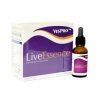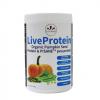There’s nothing worse than not being able to function the day after a terrible night’s sleep. You feel tired and almost sick, but it’s more than just feeling “off.” Not getting enough sleep—aka less than seven hours—may negatively affect cognitive functioning, lead to weight gain, throw off our hormones, and, according to a new study, contribute to poor nutrition.
The research presented at the American Society for Nutrition annual meeting found that people who got fewer than seven hours of sleep per night (the number the CDC recommends for adults) consumed fewer key vitamins and minerals including vitamins A, D, and B1; magnesium; niacin; calcium; zinc; and phosphorus. That’s right: Our bodies don’t make most of these micronutrients, so we need to get them through food or our environment. For example, folate is critical for DNA regeneration and found in foods like dark leafy greens and nuts and seeds.
“Our findings suggest that individuals with short sleep duration might benefit from improving their intake of these nutrients through diet and supplementation,” said the lead study author Chioma Ikonte, in a statement.
The study couldn’t say whether it was the lack of sleep causing less nutrient intake or the other way around but said that further research should delve into the role of supplementation on sleep outcomes to see if this could be a viable strategy for those who are having difficulty sleeping.
Either way, both sleep, and proper nutrition are essential for a variety of other health outcomes as we know everything in our body is interconnected. So, if you do feel like one of these is off, it’s worth investigating.
With sleep, you’ll want to track how many hours you’re sleeping at night, noting whether you wake up throughout the night. If you’re finding it difficult to fall asleep or stay asleep, you may want to try something like revamping your sleep space to induce sleepiness.
As we noted, poor nutrition could be contributing to poor sleep, so you’ll also want to check on what key vitamins or minerals you may be lacking. You can do this by getting a blood test from your doctor and discussing which vitamins you may be low in.
If that feels like a step you want to take down the line, start by incorporating more plant-based foods into your diet that contain essential vitamins and minerals. You can also try some supplements that are recommended by some experts for general health. As with adding any new protocol to your routine, you’ll want to check in with your doctor beforehand.
It’s interesting (and not very surprising) that these two essential elements of our health are linked, and we’re looking forward to hearing more about the research on the connection between the two. In the meantime, we’ll focus on getting better sleep and eating some nutrient-dense fruits and veggies.

Source: Caroline Muggia









Facebook Comments